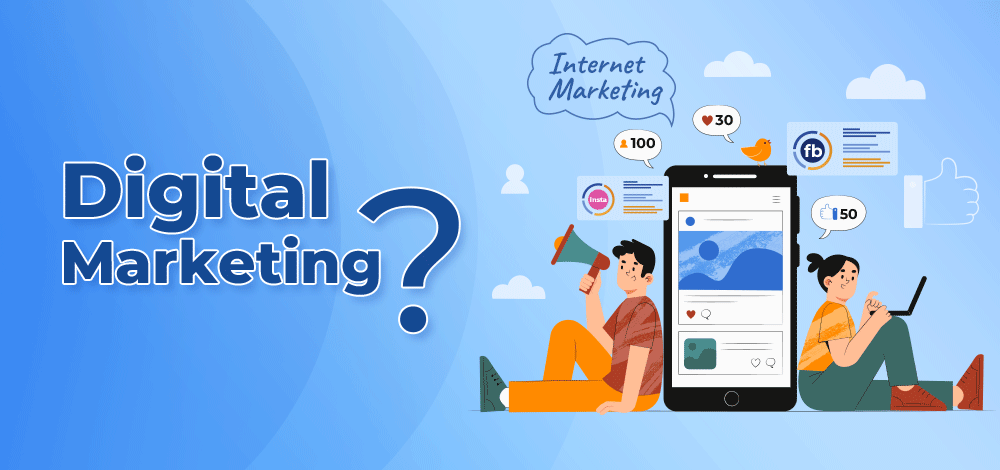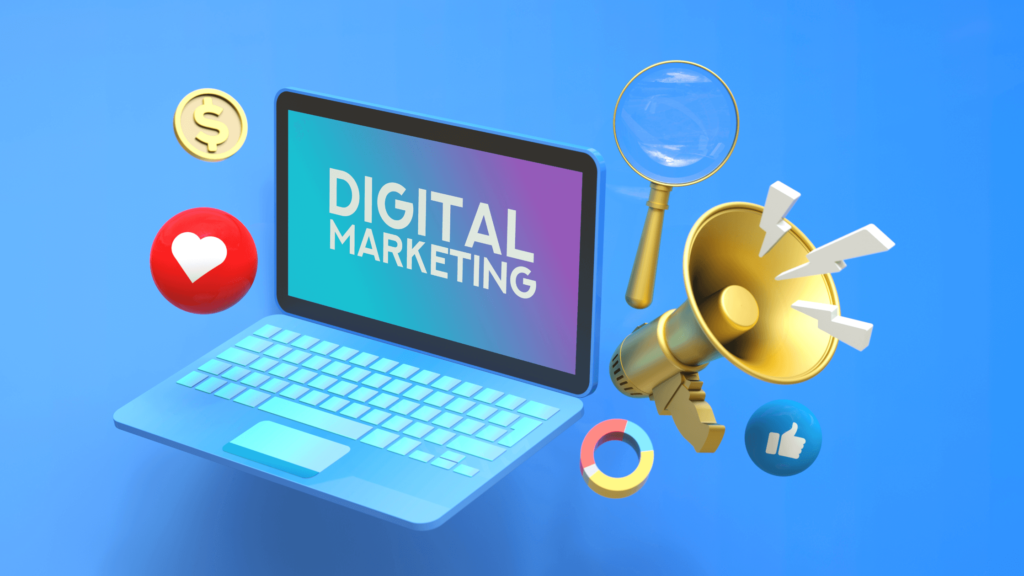Digital marketing has revolutionized the way businesses promote their products and services in the modern era. With the advent of the internet and advancements in technology, traditional marketing strategies have taken a backseat, making way for digital marketing to shine. In this article, we will detail about what is digital marketing, what are its key components, benefits, strategies, and its impact on businesses of all sizes.

What is Digital Marketing – Digital Marketing Kya Hai
Introduction
Digital marketing refers to the practice of promoting products or services using digital channels and technologies. It encompasses various online platforms such as search engines, social media, email, websites, and mobile applications to reach and engage with a targeted audience. Unlike traditional marketing methods that relied heavily on print media, television, or radio advertisements, digital marketing allows businesses to connect with their potential customers in a more direct and personalized manner.
In today’s digital age, having a strong online presence is essential for businesses to thrive. Digital marketing offers a plethora of opportunities to reach a wider audience, increase brand visibility, and drive sales. Let’s explore the evolution of digital marketing and how it has transformed the marketing landscape.

Evolution of Digital Marketing – (What is Digital Marketing)
Digital marketing has come a long way since its inception. Initially, it primarily consisted of banner ads, email campaigns, and simple websites. However, with the rapid growth of the internet, the scope and complexity of digital marketing expanded exponentially. The rise of search engines, social media platforms, and mobile devices paved the way for more sophisticated marketing strategies.
Today, digital marketing has evolved into a multi-faceted approach that incorporates various techniques to attract, engage, and convert customers. Let’s delve into the key components that form the foundation of digital marketing.
Key Components of Digital Marketing
Search Engine Optimization (SEO): SEO involves optimizing websites to rank higher in search engine results pages (SERPs). By optimizing various on-page and off-page factors, businesses can increase their organic visibility and attract relevant traffic.
Pay-Per-Click Advertising (PPC): PPC allows businesses to display targeted ads on search engines or other websites and pay only when users click on their ads. This method provides instant visibility and can be highly effective in driving traffic and conversions.
Social Media Marketing (SMM): SMM involves utilizing social media platforms such as Facebook, Instagram, Twitter, and LinkedIn to connect with the target audience. By creating engaging content, running targeted ads, and fostering a community, businesses can increase brand awareness and drive customer engagement.
Content Marketing: Content marketing focuses on creating and distributing valuable and relevant content to attract and retain a clearly defined audience. Through blog posts, articles, videos, infographics, and more, businesses can establish themselves as industry experts and build trust with their audience.
Email Marketing: Email marketing involves sending targeted emails to a list of subscribers who have shown interest in the business. It is an effective way to nurture leads, promote products or services, and maintain customer relationships. Personalized and segmented email campaigns can yield high conversion rates.
Influencer Marketing: Influencer marketing leverages the popularity and influence of individuals on social media to promote products or services. Collaborating with influencers who have a strong following and align with the brand’s values can help reach a wider audience and generate trust and credibility.
Mobile Marketing: Mobile marketing focuses on reaching the target audience through mobile devices such as smartphones and tablets. It includes mobile advertising, mobile-optimized websites, mobile apps, and SMS marketing. With the increasing use of mobile devices, businesses can tap into this channel for effective marketing.
Benefits of Digital Marketing
Digital marketing offers numerous benefits for businesses of all sizes. Let’s explore some of the key advantages:
Increased Online Visibility: Digital marketing allows businesses to reach a global audience and increase their online visibility. By implementing SEO strategies and utilizing various online platforms, businesses can improve their search engine rankings and attract more organic traffic.
Targeted Audience Reach: Unlike traditional marketing methods that cast a wide net, digital marketing enables businesses to target specific demographics, interests, and behaviors. This targeted approach ensures that marketing efforts are focused on reaching the right audience, resulting in higher conversion rates.
Cost-Effective Compared to Traditional Marketing: Digital marketing is often more cost-effective than traditional marketing channels. With digital advertising platforms offering flexible budget options and the ability to track and optimize campaigns in real-time, businesses can allocate their marketing budget more efficiently.
Measurable Results: One of the significant advantages of digital marketing is the ability to measure and track results. Businesses can analyze key metrics such as website traffic, conversion rates, click-through rates, and engagement levels. This data provides valuable insights for making data-driven decisions and optimizing marketing strategies.
Enhanced Customer Engagement: Digital marketing allows businesses to interact with their customers in real-time. Through social media comments, email responses, and personalized messaging, businesses can engage with their audience, address concerns, and provide valuable support. This fosters a strong relationship between the brand and its customers.
Digital Marketing Strategies
To effectively harness the power of digital marketing, businesses employ various strategies tailored to their goals and target audience. Let’s explore some essential strategies:
Developing a Website: A well-designed and user-friendly website serves as the foundation for digital marketing efforts. It should provide relevant information, be optimized for search engines, and offer a seamless user experience.
SEO Techniques and Practices: Implementing SEO strategies helps businesses improve their website’s visibility in search engine results. This includes optimizing website structure, keyword research, creating quality content, and building authoritative backlinks.
Social Media Platforms and Advertising: Utilizing social media platforms allows businesses to connect with their audience, share engaging content, and run targeted advertising campaigns. Each platform has its unique features and audience demographics, requiring tailored approaches for maximum impact.
Content Creation and Distribution: Creating valuable and relevant content is essential for digital marketing success. Businesses can create blog posts, articles, videos, infographics, and other forms of content to educate, entertain, and engage their target audience. Distributing this content through various channels, such as social media, email newsletters, and guest blogging, helps reach a wider audience and drive traffic to the website.
Email Marketing Campaigns: Email marketing remains a powerful tool for nurturing leads and maintaining customer relationships. By sending personalized and targeted emails, businesses can provide valuable information, promote products or services, and drive conversions. It’s important to segment the email list and craft compelling subject lines and content to increase open and click-through rates.
Analytics and Data-Driven Decision Making: Digital marketing provides access to a wealth of data and analytics that can guide decision making. By tracking and analyzing key metrics, businesses can identify what’s working and what needs improvement. This data-driven approach ensures that marketing strategies are optimized for maximum effectiveness.
Challenges and Trends in Digital Marketing
While digital marketing offers immense opportunities, it also presents challenges and keeps evolving. Let’s explore some of the challenges and current trends in the field:
Adapting to Algorithm Updates: Search engine algorithms constantly change, impacting website rankings and visibility. Businesses need to stay updated with algorithm updates and adapt their SEO strategies accordingly to maintain their online presence.
Rising Competition: As digital marketing becomes more popular, competition in the online space intensifies. Businesses need to differentiate themselves by providing unique value propositions and implementing innovative marketing strategies.
Personalization and User Experience: Consumers now expect personalized experiences and seamless user journeys. Businesses must focus on delivering personalized content and optimizing their websites for a smooth and engaging user experience.
Artificial Intelligence and Automation: AI-powered tools and automation are transforming digital marketing. Chatbots, automated email campaigns, and data analysis tools help streamline processes, improve efficiency, and deliver personalized experiences at scale.
Video Marketing and Live Streaming: Video content continues to gain popularity across digital platforms. Businesses should leverage video marketing and live streaming to engage their audience, showcase products or services, and tell compelling stories.
Voice Search Optimization: With the rise of voice assistants like Siri and Alexa, optimizing content for voice search is crucial. Businesses should focus on natural language and long-tail keywords to capture voice search queries effectively.
Digital Marketing for Small Businesses
Digital marketing is especially beneficial for small businesses with limited resources. It provides an opportunity to compete with larger competitors on a level playing field. Here are some considerations for small businesses:
Importance of Digital Presence: Establishing a strong digital presence is vital for small businesses to reach their target audience. This includes having a professional website, active social media profiles, and a consistent brand voice.
Budget-Friendly Strategies: Digital marketing offers cost-effective strategies such as social media marketing, content creation, and email campaigns. Small businesses can allocate their marketing budget strategically to maximize their return on investment.
Local SEO and Targeting Specific Demographics: Small businesses can leverage local SEO techniques to target customers in their geographical area. This includes optimizing Google My Business listings, local keywords, and customer reviews.
Conclusion
Digital marketing has become an integral part of modern business strategies. Its ability to reach a vast audience, provide measurable results, and engage customers sets it apart from traditional marketing methods. By embracing digital marketing strategies, businesses can thrive in the digital landscape, connect with their audience, and drive growth.
Incorporating SEO, PPC, social media marketing, content creation, and other digital marketing tactics can help businesses increase their online visibility, generate leads, and convert customers. It’s essential for businesses to stay up-to-date with the latest trends and challenges in digital marketing to remain competitive in the ever-evolving landscape.
Frequently Asked Questions (FAQs)
Q: How long does it take to see results from digital marketing efforts?
A: The timeline for seeing results in digital marketing can vary depending on various factors such as the industry, competition, marketing strategies, and budget. However, it’s important to note that digital marketing is an ongoing process that requires consistent effort and optimization.
Q: Can digital marketing work for small businesses with a limited budget?
A: Yes, digital marketing offers cost-effective strategies that can be tailored to fit small budgets. Social media marketing, content creation, and targeted advertising allow small businesses to reach their target audience without breaking the bank.
Q: Is it necessary to hire a digital marketing agency or can businesses handle it in-house?
A: It depends on the resources, expertise, and time available within the business. While some businesses prefer to handle digital marketing in-house, others find value in outsourcing to a digital marketing agency that can provide specialized knowledge and experience.
Q: How important is mobile optimization in digital marketing?
A: Mobile optimization is crucial in today’s digital landscape. With the increasing use of smartphones and tablets, businesses need to ensure their websites and marketing campaigns are mobile-friendly to provide a seamless user experience and reach the growing mobile audience.
Q: How can businesses measure the success of their digital marketing efforts?
A: Businesses can measure digital marketing success by tracking key metrics such as website traffic, conversion rates, click-through rates, engagement levels, and return on investment (ROI). Analytics tools and data analysis provide valuable insights into the effectiveness of marketing strategies.
In conclusion, digital marketing has transformed the way businesses promote their products and services. With its ability to target specific audiences, provide measurable results, and foster customer engagement, digital marketing has become a vital component of successful marketing strategies. By leveraging the key components of digital marketing, adapting to emerging trends, and catering to the unique needs of their business, organizations can unlock the full potential of digital marketing and drive growth in the digital era.
Remember, the world of digital marketing is constantly evolving, so it’s essential to stay informed, experiment with different strategies, and adapt to the ever-changing digital landscape.
